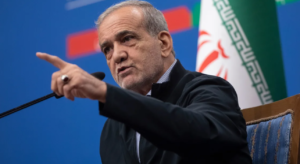President Donald Trump has agreed in principle to reduce tariffs on key U.K. exports, including automobiles, steel, and aluminum, as part of a developing trade agreement with Britain. In return, the U.K. would increase its imports of American beef and ethanol and streamline customs procedures for U.S. goods.
Though not yet finalized, the proposed deal was announced Thursday and marks a symbolic achievement for both leaders. For Trump, it demonstrates continued engagement with global partners despite his sweeping tariff policies, which have sparked global concerns about inflation and potential economic slowdowns. For U.K. Prime Minister Keir Starmer, it signals a win on the international stage and a step toward strengthening the transatlantic alliance.
From the Oval Office, Trump emphasized the pending nature of the agreement. “The final details are being written up,” he said. “In the coming weeks, we’ll have it all very conclusive.” The President highlighted increased U.S. exports as a key benefit, while Commerce Secretary Howard Lutnick noted that a base 10% tariff would remain. British officials confirmed that Trump’s 27.5% auto tariffs would be cut to 10% on up to 100,000 vehicles, and import duties on steel and aluminum would be eliminated.
Trump clarified that this deal should not be seen as a model for other nations, reaffirming his broader strategy to maintain or raise tariffs in future negotiations. “That’s a low number,” he said of the 10% rate, suggesting it may not apply elsewhere.
Speaking to Trump by phone on the anniversary of WWII’s end in Europe, Starmer underscored the historic bond between the U.S. and U.K. “To announce this great deal on the same day, 80 years forward… is incredibly important,” he said.
Later, at a Jaguar Land Rover factory, Starmer celebrated the agreement’s potential to safeguard thousands of U.K. auto jobs and hinted at more trade talks underway. “This is just the start,” he told workers. “We are hammering out further details to reduce barriers to trade with the United States and across the world.”
The announcement is the first significant trade development since Trump resumed office and reintroduced high tariffs on imports, even targeting longtime allies. On April 2, he imposed near-universal tariffs, then partially backtracked a week later, opting to pursue country-specific agreements instead.
Despite the early momentum with Britain, Trump has not yet secured new agreements with major partners like Canada, Mexico, or China. Tensions remain high with Beijing, where tariffs are still in place, and officials from both countries are preparing for new trade talks in Switzerland this weekend.
Trump expressed optimism about additional negotiations, saying, “Many other deals, which are in serious stages of negotiation, [are] to follow!”
Starmer, speaking at a defense event in London, confirmed ongoing talks with the U.S. and promised more updates soon.
Trade discussions between the U.S. and U.K. have been in motion since Britain’s 2016 decision to exit the European Union, which allowed it to negotiate independently. Talks officially began in 2020 during Trump’s first term but stalled under President Biden. They resumed after Trump returned to office in January and have gained traction in recent weeks.
Britain’s key goals include easing or removing the steep tariffs Trump imposed on cars and steel. The U.S. is the largest buyer of British vehicles, accounting for over 25% of U.K. auto exports in 2024. British negotiators are also pursuing exemptions for pharmaceutical exports, while U.S. officials seek greater access for American agricultural products.
Despite pressure, the U.K. government has resisted lowering its food safety standards to allow controversial U.S. products like chlorine-washed chicken or hormone-treated beef.
The British side views the deal as a success of Starmer’s diplomatic approach, which has avoided open conflict with Trump. Unlike the European Union, Britain did not respond to Trump’s tariffs with retaliatory measures.
Though the deal may not directly address Trump’s broader concerns about trade deficits, it would be symbolically important and offer relief to U.K. exporters. The U.S. ran a $11.9 billion goods trade surplus with the U.K. last year, with British goods making up just 2% of total U.S. imports.
For Britain, however, the U.S. is a vital economic partner and its top trading destination. While most of those exports are services, a goods-focused agreement would still carry weight.
Trump highlighted the appeal of American-made products, stating, “I think that the United Kingdom, like every other country, they want to… go shopping in the United States of America.”
This agreement is one of several Starmer’s government is pursuing. Earlier this week, Britain reached a trade deal with India after three years of talks. It is also seeking to improve post-Brexit trade arrangements with the EU.













